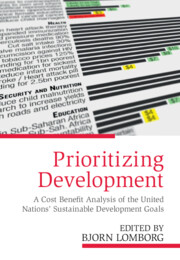 Prioritizing Development
Prioritizing Development Published online by Cambridge University Press: 30 May 2018
As realization has grown of the impact of air pollution, so too has it become clear that the effects of individual pollutants are linked and that they cannot be considered purely in isolation. Health has become the prime driver of air pollution policies in North America and Europe since the mid-1990s, following new analysis that found detectable effects at levels previously considered “safe” and no evidence for an exposure threshold for fine particulates.
Considering Larsen's chapter, the first point is that the focus is on epidemiology, which in isolation provides no proof of causality. However, the evidence in this case is considered to demonstrate causality, so the author's reliance on epidemiological data is not problematic. However, there is more problem with attribution of health impacts to fine particles because other pollutants such as ozone, SO2, NO2, and dioxins also have an effect. Ozone impacts may add 20 percent or more to the total damage quantified in European policy assessments for fine particles. NO2 may cause greater impacts still, perhaps of a similar magnitude to fine particles. Larsen's analysis may therefore be an underestimate of impacts because he focuses on PM2.5 alone.
Another question is whether all particles have an equal impact on health. Although their different chemical and physical nature must make some difference, fine particles do generally appear to be harmful to health. Differentiating them is unlikely to make any significant changes to policy necessary.
An important issue is the actual impact of pollution, which is inferred to be the sole cause of death. In fact, it could also be one of a number of contributory factors that affect longevity or, alternatively, a final trigger for death. Such questions areof relevance for valuing mortality effects. Larsen states that there are four times as many deaths attributed to air pollution as to infant and maternal undernutrition. However, this comparison may not be valid because child and maternal mortality accounts for a much higher quantity of lost life expectancy.
Although mortality is clearly important, the effect on morbidity also warrants attention, for example, the impact of cancers, cardiovascular disease, and stroke. This adds to the health burden both directly and via the demands it places on the health system. We should also remember that the benefits of clean air policies are broader than health alone.
To save this book to your Kindle, first ensure [email protected] is added to your Approved Personal Document E-mail List under your Personal Document Settings on the Manage Your Content and Devices page of your Amazon account. Then enter the ‘name’ part of your Kindle email address below. Find out more about saving to your Kindle.
Note you can select to save to either the @free.kindle.com or @kindle.com variations. ‘@free.kindle.com’ emails are free but can only be saved to your device when it is connected to wi-fi. ‘@kindle.com’ emails can be delivered even when you are not connected to wi-fi, but note that service fees apply.
Find out more about the Kindle Personal Document Service.
To save content items to your account, please confirm that you agree to abide by our usage policies. If this is the first time you use this feature, you will be asked to authorise Cambridge Core to connect with your account. Find out more about saving content to Dropbox.
To save content items to your account, please confirm that you agree to abide by our usage policies. If this is the first time you use this feature, you will be asked to authorise Cambridge Core to connect with your account. Find out more about saving content to Google Drive.